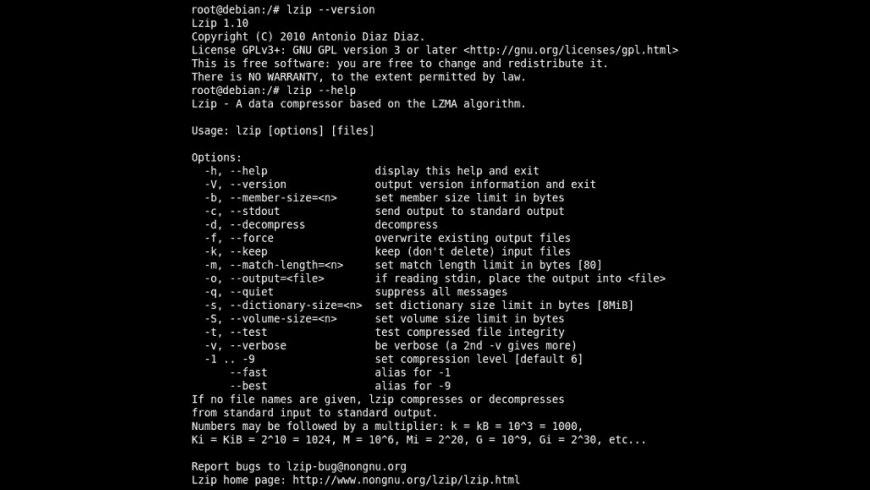
Lzip7z is a small plugin for the popular 7-Zip archiver. You can use Lzip7z to open, modify, or create .lz archives that are widely used on Unix-like systems.

Installation
To install IO::Compress::Lzip, copy and paste the appropriate command in to your terminal. Cpanm IO::Compress::Lzma CPAN shell. Invitrogen Anti-LZIP Polyclonal, Catalog # PA5-76098. Tested in Western Blot (WB), Immunofluorescence (IF) and Immunocytochemistry (ICC) applications. This antibody reacts with Human, Mouse samples. Supplied as 100 µL purified antibody (1 mg/mL).
The Lzip7z distribution package is an ordinary Zip archive that contains the following four files:
- Lzip.64.dll – the 64-bit version of the plugin
- Lzip.32.dll – the 32-bit version of the plugin
- Lzip.ini – the configuration file
- ReadMe.txt – the user instructions
To install the plugin into the 7-Zip installation folder, you need to create the 'Formats' subfolder. After that, copy Lzip.64.dll or Lzip.32.dll (depending on your 7-Zip edition) and Lzip.ini to that subfolder. If you do that, each time you launch 7-Zip, it will automatically find Lzip7z and use it when opening .lz files.
Using
Unpacking
An .lz archive can contain only one file, which is typically a .tar file ('tarball'). Unix systems traditionally use the .tar format to pack multiple files. To access an arbitrary file contained in the .tar file, 7-Zip extracts its entire contents to a temporary directory.
In some cases an .lz file consists of multiple independently decompressible data sections (a 'multimember archive'). If that is the case, 7-Zip can access an arbitrary file in the .tar file without creating a temporary file. Lzip7z inherently supports that mode. You can disable the support for that mode by modifying the .ini file in the plugin directory. By default, the .ini file contains the following strings:
If you change the value of the StreamSupport parameter to 0, 7zip will always create temporary files. The MaxMemberSize parameter sets the maximum allowed size of an unpacked independently decompressible data section in bytes for accessing the contents of the .tar file without creating a temporary file.
Packing
If you want to pack a single file to an .lz archive, select the 'lzip' option in the 'Archive format' drop-down list. If you need to pack multiple files to a single .lz archive, first pack all of them to a container file (for example, .tar), and then pack that file to an .lz archive.
You can also enter additional parameters into the Parameters text input field:
- The parameter d sets the dictionary size in bytes. The minimum allowed size is 4 KB, and the maximum allowed size is 512 MB.
- The parameter fb sets the number of fast bytes. The minimum is 5, and the maximum is 273.
- The parameter s sets the size of an unpacked independently decompressible data section in bytes.
Current version
- Plugin version: 1.6
- Distribution package size: 204 KB
- Distribution package release date: 10 Dec 2017
Additional information
Lzip Decompress


Lzip Xz

Zip Code Lookup
You can open, modify, or create .lz archives just like ordinary folders directly in Explorer using TC4Shell. You can also use TC4Shell to create .tar.lz archives in one click.
